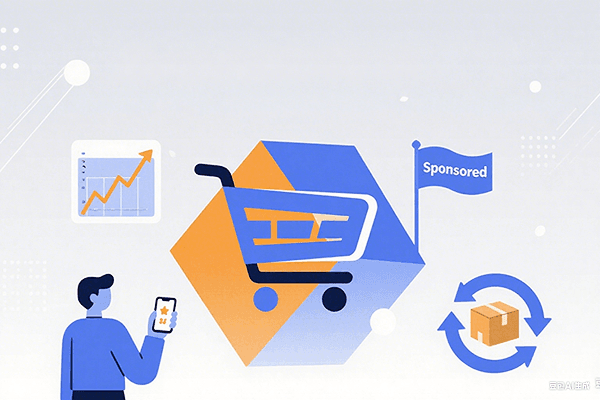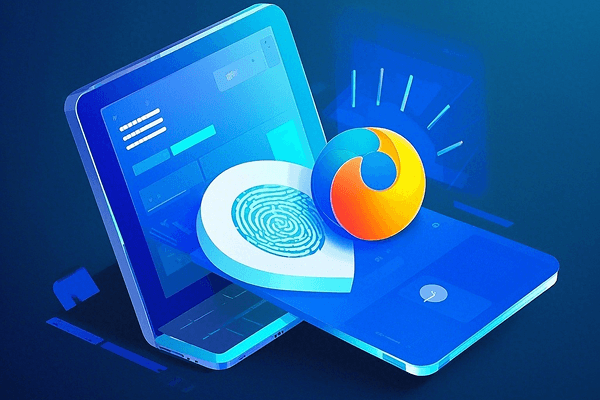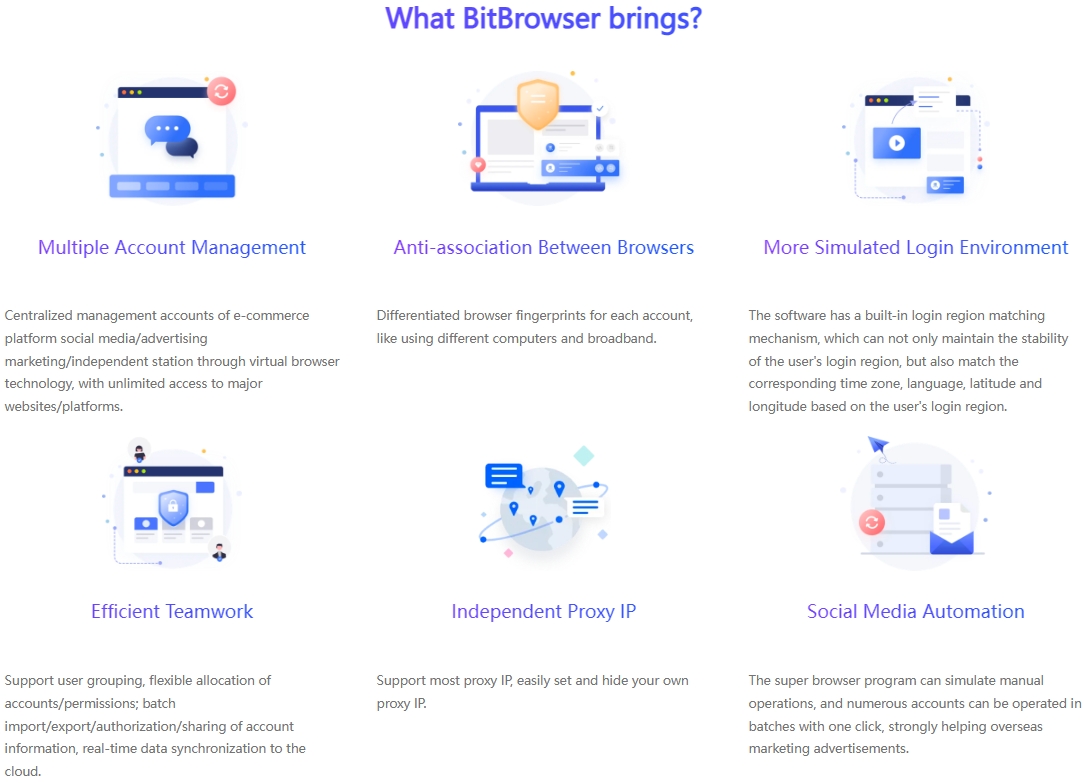
Hot Picks
How to run Facebook ads in 2025? Ideas

Hot Picks
How to promote on Amazon? Sharing various promotion methods

Hot Picks
Choose BitBrowser for fingerprint browsers, and look for the only official website: bitbrowser.cn
Telegram vs Whatsapp: Which tool should e-commerce sellers choose?
Time: 2024-06-12 10:22 Click:
Messaging apps have become an essential tool for businesses to connect with customers, streamline communication processes, and cultivate relationships. Among the many instant messaging platforms available, Telegram and WhatsApp are the two most popular options for personal and business use. Both platforms offer unique features to suit different business needs, but understanding the subtle differences between Telegram and WhatsApp is critical to making an informed decision.
Telegram Introduction

1. Features and Interface
Telegram presents a very friendly interface and attaches great importance to security and customizability. It has many powerful features, such as private conversations with end-to-end encryption, self-destructing messages, large group chats that can accommodate up to 200,000 members, and the ability to send files up to 2GB. In addition, Telegram supports robots and channels, which makes it easy for businesses to automate tasks and deliver messages to a large audience.
2. Security
Telegram pays great attention to privacy protection, which is reflected in the setting of private chats, self-destructing messages, and has the feature of using usernames instead of phone numbers to increase anonymity. It also allows users to delete messages in a conversation, giving users greater control over their data.
3. Extended functionality
Telegram offers a wide range of business-friendly features with bots and channels. Bots can automate customer support, provide information, and perform a variety of tasks. Channels allow messages to be broadcast to a wide audience, making it a great choice for businesses to spread information or updates.
4. Ease of use
Although not as popular as WhatsApp, Telegram has successfully attracted users who want stronger privacy protection and more customization options. It is favored by technology enthusiasts, security-conscious businesses, and those who value the platform's diversity in features and customization.
About WhatsApp

1. Features and interface
WhatsApp has always attracted attention for its simple style and large user base. It performs well in messaging, enables voice and video calls, and has end-to-end encryption to ensure the security of communications. WhatsApp is equipped with practical tools such as automatic welcome messages, quick response methods, and chat classification labels. It also has the unique function of building business profiles with basic content such as location information, contact methods, and business details. In this article of BitBrowser, we also introduce you to more functions in detail: (WhatsApp hidden functions revealed, with multiple WhatsApp safe use plans)
2. Security
WhatsApp, which belongs to Meta, also puts security in an important position, and achieves it through the use of end-to-end encryption technology. However, some of its data sharing behaviors with its parent company have aroused attention, causing users to have some concerns about privacy issues.
3. Extended functions
WhatsApp Business is closely integrated with the entire WhatsApp ecosystem, which can achieve seamless connection with WhatsApp and Instagram. This deep integration allows companies to use the WhatsApp Business API to uniformly manage inquiries from multiple platforms, greatly facilitating the management of customer relationships.
4. Ease of use
With an extremely large number of users, WhatsApp has become a platform for companies to reach a wider audience more easily. Its simple and easy-to-use interface and the fact that it is accepted by many individual users around the world make it the first choice for customer communication.
Telegram vs. WhatsApp: Which is the best platform for your business?
Determining the best platform for your business between Telegram and WhatsApp is influenced by many factors, such as your specific business needs, target audience, preferred features, and priorities. Both platforms have their own unique features and advantages, so evaluating these aspects can help you make an informed decision.
The key to choosing between Telegram and WhatsApp is to align the platform's features with your business goals. Evaluating factors such as audience demographics, required features, security preferences, and integration requirements can guide you to select the platform that best fits your business model and promotes effective communication and interaction with customers.
Evaluating these points will help you determine which platform better meets your business goals and customer interaction requirements.
The best solution for e-commerce sellers using both tools
When there is a need to promote a brand, a carefully considered strategy is to promote it on both Telegram and WhatsApp. Such a strategy can effectively expand the brand's influence and make full use of the unique advantages of both platforms. This is also the key reason why many e-commerce companies decide to open multiple stores on multiple platforms to attract traffic and promote.
However, when choosing to promote on both platforms simultaneously, e-commerce sellers must also face the challenges of managing multiple social media accounts. This not only requires a unique content strategy for each platform, but also requires caution to avoid problems with the association between accounts, otherwise it may cause the account to be blocked or restricted, which will affect the consistency and effectiveness of the entire marketing campaign.
In order to manage multiple social media accounts efficiently and safely, e-commerce sellers can use professional tools such as BitBrowser Fingerprint Browser. This multi-account management tool designed specifically for social media marketing and e-commerce can help sellers easily switch between different social media accounts, while also ensuring the security of accounts and effectively preventing the risk of being blocked due to association.
One of the core functions of BitBrowser is "fingerprint protection". Every device leaves a unique "fingerprint" information when it goes online, such as IP address, user agent, screen resolution, etc. BitBrowser can manage and protect the browser fingerprint information of each account, ensuring that unique and consistent fingerprint data is displayed to the social media platform every time you log in, thereby reducing the risk of being detected by the platform.

In addition, BitBrowser also integrates the proxy IP function, allowing users to configure different proxy IPs for each account environment, so that each account looks like it is from a different region, effectively avoiding platform restrictions caused by IP address association or abnormal geographical location.
What is even more gratifying is that BitBrowser also has RPA (Robotic Process Automation) function, which allows users to create automated workflows through simple drag and drop operations without writing complicated scripts. This function can be used for a variety of tasks such as automated publishing of social media content, automatic reply to messages, and management of advertising, greatly improving work efficiency and accuracy.
Summary:
Both platforms have obvious advantages and meet different business needs. Carefully evaluating these platforms based on your business priorities will enable you to leverage the features and functions that best meet your goals to ensure efficient and influential communication with your audience. By using professional tools such as BitBrowser, e-commerce sellers can manage multiple social media accounts more safely and efficiently, and achieve automation and batch processing of marketing strategies. This not only improves work efficiency, but also enhances account security, allowing sellers to focus more on business growth and strategic planning.